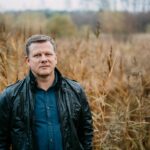Ēriks Ešenvalds is one of the most sought-after composers working today, with a busy commission schedule and performances of his music heard on every continent. Born in Priekule, Latvia in 1977, he studied at the Latvian Baptist Theological Seminary (1995–97) before obtaining his Master’s degree in composition (2004) from the Latvian Academy of Music under the tutelage of Selga Mence. He took master-classes with Michael Finnissy, Klaus Huber, Philippe Manoury, and Jonathan Harvey, amongst others. From 2002–11 he was a member of the State Choir Latvija. In 2011 he was awarded the two-year position of Fellow Commoner in Creative Arts at Trinity College, University of Cambridge. He is married with four children and gives students his expertise as composition teacher at the Latvian Academy of Music.
Ēriks Ešenvalds has won multiple awards for his work, including the Latvian Grand Music Award three times (2005, 2007, and 2015). The International Rostrum of Composers awarded him first prize in 2006 for his work The Legend of the Walled-in Woman. He was The Year’s New-Composer Discovery of the Philadelphia Inquirer in 2010. In 2018 he was bestowed Officer in the Order of the Three Stars, the highest state decoration of his home country Latvia, for merits in the field of culture.
Ēriks Ešenvalds’ compositions have been premiered by ensembles including the Boston Symphony Orchestra, the City of Birmingham Symphony Orchestra, Utah Symphony, Britten Sinfonia, Gewandhaus Leipzig, The King’s Singers, Latvian Voices, the Choir of Trinity College Cambridge, the Holst Singers, Imogen Heap, Polyphony, the Choir of Merton College Oxford, the Latvian Radio Choir, the State Choir Latvija, Youth Choir Kamēr…, Sinfonietta Riga, the Bavarian Radio Choir, the Latvian National Symphony Orchestra, Latvian National Opera and Ballet, the Liepaja Symphony Orchestra, Ora Singers, National Youth Choir of Great Britain, BBC Proms Youth Choir, the Netherlands National Children’s Choir, Shenzhen Lily Choir, New Zealand Youth Choir, the Swedish Art Vocal Ensemble, the Choir of Trinity College Melbourne, Salt Lake Vocal Artists, Temple University Concert Choir, The Crossing, Chor Leoni, Golden Gate Men’s Chorus, Portland State University Chamber Choir, the Choir of the West at Pacific Lutheran University in Tacoma, ChorWerk Ruhr, Cathedral Choral Society, Cor Vivaldi, The University of Louisville Cardinal Singers, Yale Glee Club, the Miami University Men’s Glee Club, The University of Mississippi Concert Singers, Lincoln’s Inn Choir, Wartburg College Choir, Oklahoma State University Concert Chorale, Classical Movements, Saint Louis Chamber Chorus, Louisville University Cardinal Singers, Cabrillo Chorus, and the Monterey Chamber Orchestra. He composed the score for the Latvian feature film Mellow Mud, which was awarded at the 2016 Berlin International Film Festival and 2017 Palm Springs International Film Festival.
Ēriks Ešenvalds’ music has been performed at numerous international festivals including Klangspuren in Austria, the Schleswig-Holstein Musik Festival in Germany, Tenso Days in France, the Haarlem Choir Biennale and Cello Biennale Amsterdam in the Netherlands, the Latvian Song and Dance Festival and International Sacred Music Festival in Latvia, the World Choir Games, IFCM World Symposium on Choral Music, the BBC Proms, Cheltenham Music Festival, and Voices Now in the UK, Grant Park Music Festival, the ACDA National and Regional Conferences, and Spoleto Festival in the US, and The Singing Network in Canada. He was commissioned for Latvia’s centenary celebrations on the 2018 Proclamation Day and for the 2013 National Remembrance Day of the Netherlands.
Ēriks Ešenvalds is a popular public speaker, which he often combines with leading workshops on his music. At the 2014 World Choir Games held in Riga, he composed the Games anthem, gave a major presentation on his work, acted on competition juries, and had a large-scale production premiered by the Latvian Voices and The King’s Singers. The 2015 ACDA National Conference in Salt Lake City premiered his Whispers on the Prairie Wind, where he also gave a presentation on his music, and took part in a composer roundtable forum. He was a speaker at the 2017 IFCM World Symposium on Choral Music in Barcelona, the 2018 Chorus America Conference in Chicago, the 2018 Choral Canada Podium Conference & Festival and 2018 and 2015 Singing Network International Symposium in St John’s, Canada, Choral Connect 2017 in Auckland, and at IAML 2017, the 66th annual congress of the International Association of Music Libraries, Archives and Documentation Centres in Riga. He served as a jury member at the 2018 International Baltic Sea Choir Competition in Jūrmala, the 2019 and 2017 Musica Sacra Nova International Composers Competition under the patronage of the Pontifical Institute of Sacred Music in Rome, the 2017 Cantat International Choral Festival and Symposium in Manado, Indonesia, and the 2016 Rimini International Choral Competition.
Ēriks Ešenvalds’ compositions appear on many recordings released by labels such as Decca Classics, Delphian, Deutsche Grammophon, Hyperion, Naxos, Ondine, Pentatone, and Signum. To date, ten recordings are devoted exclusively to his work: Northern Lights from Trinity College Choir Cambridge (Gramophone Award Shortlist and Critics’ Choice, ICI Radio-Canada Best Albums Selection), Passion and Resurrection from Polyphony with Britten Sinfonia, St Luke Passion from the Latvian Radio Choir and Sinfonietta Riga (Gramophone Editor’s Choice, Opera News Critic’s Choice), Translations (Gramophone’s Critics’ Choice and Editor’s Choice) and The Doors of Heaven (Gramophone Editor’s Choice) from Portland State Chamber Choir, There Will Come Soft Rains by Choir of the West at Pacific Lutheran University (Gramophone’s Editor’s Choice), From the Dim and Distant Past and At the Foot of the Sky from State Choir Latvija (Best Latvian Classical Album of the Year), O Salutaris from Youth Choir Kamēr… (Best Latvian Classical Album of the Year), and most recently the compilation Latvian Radio Archive: Ēriks Ešenvalds. His work Earth Teach Me Quiet recorded live by The Crossing on their Grammy-nominated album Rising w/ The Crossing was selected amongst The New York Times 25 Best Classical Music Tracks of 2020.
Ēriks Ešenvalds’ recent large-scale premieres include Lakes Awake at Dawn for the Boston Symphony Orchestra and City of Birmingham Symphony Orchestra, The Pleiades for the Grant Park Music Festival Chicago, A Shadow for the BBC Proms, Dreams Under Your Feet for the Gewandhaus Leipzig, Whispers on the Prairie Wind for the Utah Symphony and Utah Chamber Artists, St Luke Passion for the Latvian Radio Choir and Sinfonietta Riga, and Visions of Arctic: Sea for the Liepāja Symphony Orchestra. His full-scale opera The Immured was premiered at the Latvian National Opera in 2016 to great acclaim. 2018 saw the premiere of his second major multimedia symphony based on volcanoes. Nordic Light, his first multimedia symphony on the natural phenomenon of the aurora borealis, was performed in the US, Canada, and Germany, and is the subject of the documentary film Nordic Light: A Composer’s Diary, which follows the composer on his expeditions to the Arctic region.
Ēriks Ešenvalds’ premieres this season include commissions from the ‘Lietuva’ ensemble Lithuania, Musica Viva Australia, Christ Church Houston, and others. He will travel to the USA, Japan, and many European countries to work with choirs both as composer and conductor.
Edition Peters Artist Management is managing Ēriks Ešenvalds’ commissions and workshop schedule. Ēriks Ešenvalds is published by Musica Baltica in global partnership with Edition Peters.
www.eriksesenvalds.com



 Nicolas Ellis is the Artistic Director, Conductor and Founder of the Orchestre de l’Agora and currently serves as Artistic Partner to the Orchestre Métropolitain and Yannick Nézet-Séguin. He was recently named Principal Guest Conductor for Les Violons du Roy, starting in the 2023-2024 season.
Nicolas Ellis is the Artistic Director, Conductor and Founder of the Orchestre de l’Agora and currently serves as Artistic Partner to the Orchestre Métropolitain and Yannick Nézet-Séguin. He was recently named Principal Guest Conductor for Les Violons du Roy, starting in the 2023-2024 season. Norwegian conductor Rune Bergmann is currently Music Director of Canada’s Calgary Philharmonic, Artistic Director & Chief Conductor of Poland’s Szczecin Philharmonic, and Chief Conductor of Switzerland’s Argovia Philharmonic, positions he has held since the 2017/18, 2016/17, and 2020/21 seasons, respectively.
Norwegian conductor Rune Bergmann is currently Music Director of Canada’s Calgary Philharmonic, Artistic Director & Chief Conductor of Poland’s Szczecin Philharmonic, and Chief Conductor of Switzerland’s Argovia Philharmonic, positions he has held since the 2017/18, 2016/17, and 2020/21 seasons, respectively. Jan Lisiecki’s interpretations and technique speak to a maturity beyond his age. At 27, the Canadian performs over a hundred yearly concerts worldwide, and has worked closely with conductors such as Antonio Pappano, Yannick Nézet-Séguin, Daniel Harding, Manfred Honeck, and Claudio Abbado (†).
Jan Lisiecki’s interpretations and technique speak to a maturity beyond his age. At 27, the Canadian performs over a hundred yearly concerts worldwide, and has worked closely with conductors such as Antonio Pappano, Yannick Nézet-Séguin, Daniel Harding, Manfred Honeck, and Claudio Abbado (†).
 Handel started three commercial opera companies to supply the English nobility with Italian opera. The lavish productions included live birds, fireworks, and incredibly complex parts that led to some off-stage drama with his leading ladies. One soprano apparently refused to sing a difficult piece and argued with Handel until he lifted her in the air and threatened to throw her out the window. In another argument with artists, again sopranos, Handel ended up writing each singer an aria of equal length down to the number of notes to try to appease their jealousy and ease tensions. The public took sides, and at one famed performance in 1927 the evening ended with the two singers in a hair-pulling brawl on stage.
Handel started three commercial opera companies to supply the English nobility with Italian opera. The lavish productions included live birds, fireworks, and incredibly complex parts that led to some off-stage drama with his leading ladies. One soprano apparently refused to sing a difficult piece and argued with Handel until he lifted her in the air and threatened to throw her out the window. In another argument with artists, again sopranos, Handel ended up writing each singer an aria of equal length down to the number of notes to try to appease their jealousy and ease tensions. The public took sides, and at one famed performance in 1927 the evening ended with the two singers in a hair-pulling brawl on stage.